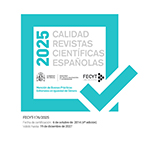Evaluación de los resultados de aprendizaje de la competencia creatividad vinculada al ODS6: Agua limpia y saneamiento. Un estudio de caso en el contexto universitario
Resumen
Introducción: La Agenda 2030 considera la Educación en Desarrollo Sostenible (EDS) una herramienta esencial para afrontar los enormes desafíos actuales que exigen transformaciones globales. La universidad promueve múltiples iniciativas docentes para desplegar las competencias en sostenibilidad (CS), aunque de la mayoría se desconoce su impacto en el aprendizaje. El objetivo de este artículo es evaluar desde la perspectiva del alumnado y según un instrumento propuesto, los resultados de aprendizaje cognitivos, socioemocionales y comportamentales de una práctica sobre EDS, el desarrollo de la competencia creatividad en base al ODS6: Agua limpia y saneamiento. Se inicia con una revisión literaria de la conceptualización de la EDS y del alcance de su implantación, especialmente en el contexto universitario español, siguen la metodología, los resultados y su discusión. Método: Una investigación de tipo mixto. Inicialmente de tipo cualitativo con el desarrollo de dos grupos de discusión y posteriormente de tipo cuantitativo en base a un cuestionario diseñado ad hoc que se distribuyó a los 149 alumnos del penúltimo curso de la Facultad de Ciencias Económicas y Empresariales de la Universidad de Deusto (UD), una vez finalizada la práctica. Se obtuvieron 121 respuestas. Resultados: Los alumnos perciben que han aumentado sus conocimientos sobre los ODS y la conciencia sobre la importancia del agua y creen que su comportamiento sobre ella será más responsable. Aunque necesaria, consideran reducida la formación sobre sostenibilidad recibida. Manifiestan motivación y una actitud favorable para abordar retos formativos similares y comprometerse en la solución de los problemas sociales. Discusión: La práctica y la actitud del alumnado suponen una excelente oportunidad para contribuir al impulso de la sostenibilidad. Se plantean propuestas de mejora.
Descargas
Descarga artículo
Licencia
La Revista Complutense de Educación, para fomentar el intercambio global del conocimiento, facilita el acceso sin restricciones a sus contenidos desde el momento de su publicación en la presente edición electrónica, y por eso es una revista de acceso abierto. Los originales publicados en esta revista son propiedad de la Universidad Complutense de Madrid y es obligatorio citar su procedencia en cualquier reproducción total o parcial. Todos los contenidos se distribuyen bajo una licencia de uso y distribución Creative Commons Reconocimiento 4.0 (CC BY 4.0). Esta circunstancia ha de hacerse constar expresamente de esta forma cuando sea necesario. Puede consultar la versión informativa y el texto legal de la licencia.











